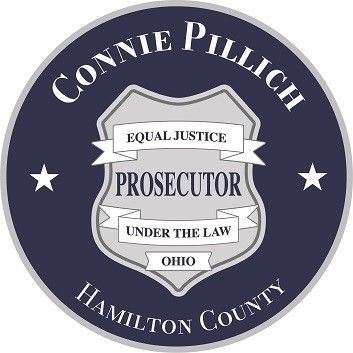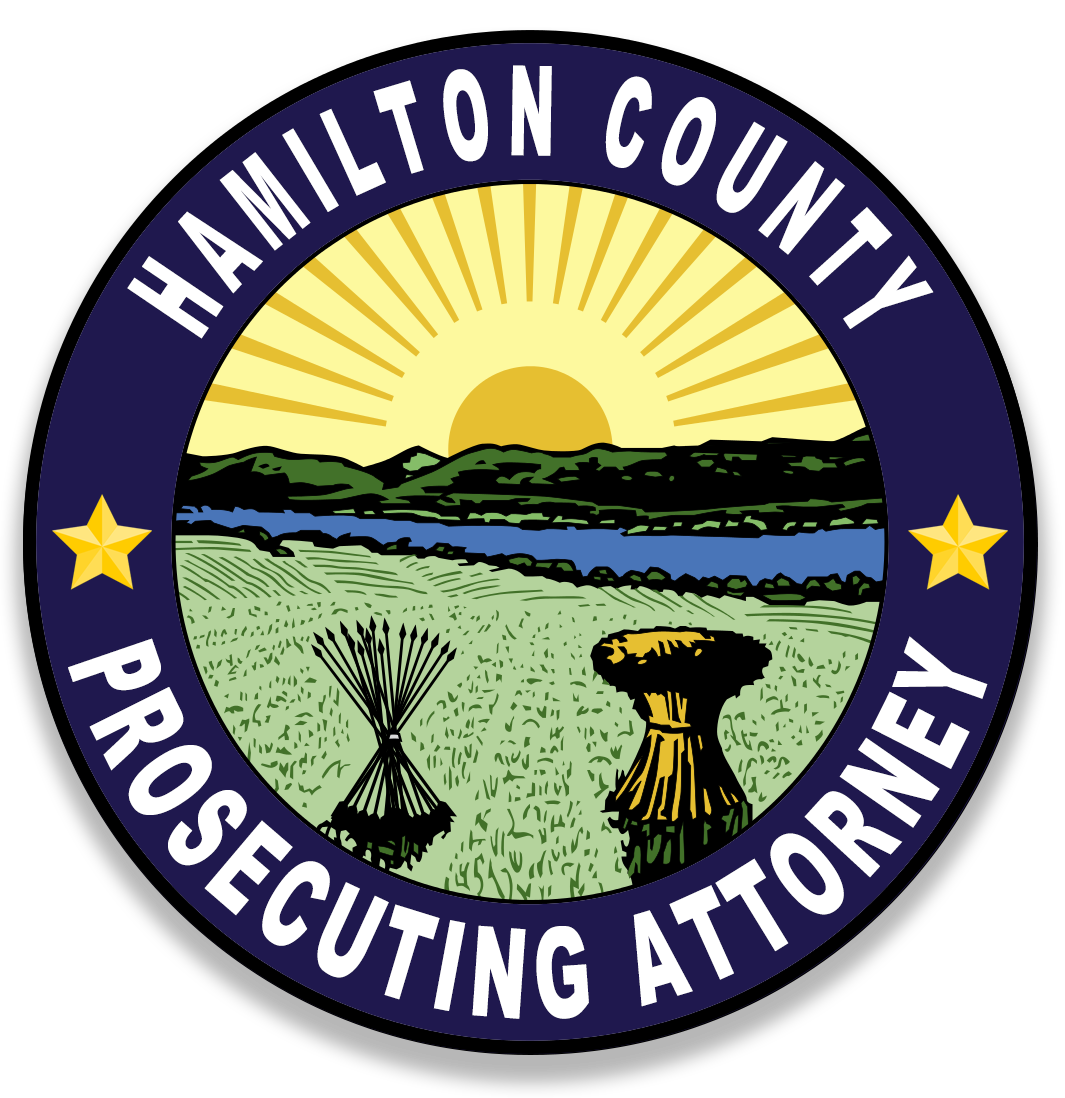VICTIM SERVICES
Civil Protection Order
- Civil Protection Orders limit or prohibit contact between abuser and victim in the context of a marriage or when the parties have a child in common.
- CPOs are granted by the county’s Domestic Relations Court. These courts can hear motions for CPOs with or without criminal charges pending.
To obtain a Civil Protection Order, please click here or contact Hamilton County Domestic Relations Court at 513-946-9000 https://www.hamiltoncountyohio.gov/government/courts/court_of_domestic_relations/domestic_violence_and_dating_violence_cpo
I am a victim of crime and I recently moved. Do I need to update my address with the Prosecutor’s Office?
- YES
- If your case is pending, please contact the Prosecutor’s Office to notify them of your new address.
- This will ensure you continue to receive letters and subpoenas to update you on the status of your case
I received a letter from the Prosecutor’s Office about my next court date. Do I need to attend?
- The Victim/Witness unit will send letters to you to notify you about every date as your case proceeds.
- While victims are always permitted to attend any court date, unless you receive a subpoena, you are not required to attend.
- Subpoenas will be clearly marked.
When is my next court date?
To find out when your case is set, please visit the Clerk of Court’s website, or contact our office at 513-946-3000.
Types of Court Dates:
The name given to the type of hearing can be confusing. Below are the common ways a case is docketed, and what those settings mean
Arraignment
- The initial hearing where the defendant is informed of his charges and a bond is set.
- Victims are entitled to attend these hearings and address the court regarding bond, if they wish.
Discovery Scheduling Conference
- The initial hearing for felony cases in front of the assigned trial judge.
- This setting allows the prosecutor, defense attorney, and police officers to discuss the details of the case, and address any outstanding discovery or issues that may exist.
- Victims are entitled to be at this hearing, however, unless you receive a subpoena you are not required to attend
Pretrial
- After the Discovery Scheduling Conference, there are usually several pretrials settings before a case is resolved
- These settings are “check-in” dates to allow the prosecutor and defense attorney to discuss the case and any ongoing discovery discussions.
- These settings may also be used to discuss the possibility of plea agreements
- If a plea is being discussed, the prosecutor will either call you to discuss the options or subpoena you to court to discuss in-person.
- Victims are entitled to be at these hearings, however, unless you receive a subpoena, you are not required to attend.
- These court dates may also be referred to as “plea or trial” or “plea,” depending on the specific courtroom
- Plea or Trial Setting
- After the Discovery Scheduling Conference, there are usually several pretrials settings before a case is resolved
- These settings are “check-in” dates to allow the prosecutor and defense attorney to discuss the case and any ongoing discovery discussions.
- These settings may also be used to discuss the possibility of plea agreements
- If a plea is being discussed, the prosecutor will either call you to discuss the options or subpoena you to court to discuss in-person.
- Victims are entitled to be at these hearings, however, unless you receive a subpoena, you are not required to attend.
- These court dates may also be referred to as “pretrial” or “plea,” depending on the specific courtroom
Plea
- After the Discovery Scheduling Conference, there are usually several pretrials settings before a case is resolved
- These settings are “check-in” dates to allow the prosecutor and defense attorney to discuss the case and any ongoing discovery discussions.
- These settings may also be used to discuss the possibility of plea agreements
- If a plea is being discussed, the prosecutor will either call you to discuss the options or subpoena you to court to discuss in-person.
- Victims are entitled to be at these hearings, however, unless you receive a subpoena, you are not required to attend.
- These court dates may also be referred to as “plea or trial” or “pretrial,” depending on the specific courtroom
Motions
- If a motion has been filed by either the prosecution or the defense, the court will schedule a date for that motion to be heard.
- The types of motions that may be heard could include bond motions, motions to suppress, or motions in limine.
- Victims are entitled to be at any motion hearing, however, unless you receive a subpoena, you are not required to attend.
Bench Trial
- A case will be set for bench trial if a plea agreement cannot be reached and a defendant has chosen to waive his right to a jury trial.
- These trials are conducted in front of the judge, and the judge will determine the defendant’s guilt.
- If you are a victim on a case, your presence is required.
- If your case is set for bench trial and you have not received a subpoena, please contact the Prosecutor’s Office at 513-946-3000
Jury Trial
- A case will be set for jury trial if a plea agreement cannot be reached.
- In the case of a jury trial, a panel of citizens will determine the defendant’s guilt.
- If you are a victim on a case, your presence is required.
- If your case has been set for jury trial and you have not received a subpoena, please contact the Prosecutor’s Office at 513-946-3000.
Bond
- A case will be set for bond hearing if either the prosecutor or defendant has made a motion to address the defendant’s current bond.
- Victims are entitled to be present at these hearings and address the court.
Safe at Home Program
- The Safe at Home address confidentiality program was created to assist survivors of domestic violence, stalking, human trafficking, rape or sexual battery.
- This program shields the victims’ personal information from Ohio voter registries
- Safe at Home allows a program participate who is eligible to vote to register without his or her voter registration appearing in public voter registration lists, and to vote absentee without his or her address being compromised.
- For more information about Safe at Home, click here https://www.ohiosos.gov/secretary-office/office-initiatives/safe-at-home/
Offender Release Notification System
- If your offender has been sent to prison, you can register with VINE to received automated notification of that person’s custody status
- This allows you to remain up-to-date to keep yourself safe!
- To register for VINE, please click here https://www.ohioattorneygeneral.gov/Individuals-and-Families/Victims/Victim-Notification
How to Report Child Abuse
- Anyone can anonymously report child abuse
- A person who makes a child abuse or neglect report should be prepared to provide:
- Child’s name
- Child’s address
- Child’s age
- Parents’ names
- The reason abuse or neglect is suspected
- To report child abuse or neglect in Hamilton County, please call 513-241-KIDS (5437).
- *ANYONE WHO BELIEVES A CHILD IS IN IMMEDIATE DANGER SHOULD CALL 911*
Ohio Crime Victims Justice Center
- OCVJC provides free legal representation and help to navigate the criminal justice process.
- OCVJC services include:
- Education to crime victims on their specific rights
- Representation of victims in criminal court
- Investigation of victim’s rights violations
- Referrals for victims and survivors to applicable resources
- Assistance to victims with preparation of impact statements and restitution paperwork
To learn more about OCVJC, click here https://www.ocvjc.org/
Crime Victim’s Compensation Fund
- If you or you’re a member of your family has been a victim of a violent crime, financial assistance may be available through the Ohio Attorney General’s Office.
- This fund pays for a wide range of expenses such as medical and counselling bills, transportation or mileage costs for medical appointments and certain court hearings, lost wages, and costs associated with obtaining a protection order.
- To find out if you qualify, please click here https://www.ohioattorneygeneral.gov/Individuals-and-Families/Victims/Apply-for-Victims-Compensation
Sexual Assault Evidence Kit Tracking System
- The Ohio Attorney General’s Office operates an online system to track the status of sexual assault evidence kits
- To track your sexual assault evidence kit, please click here https://sakt.ohioattorneygeneral.gov/
Stalking or Sexually Oriented Offense Protection Orders
- These protection orders limit or prohibit contact between an offender and a victim. These orders are intended for victims of stalking or sexual assault.
- These orders are obtained in the Hamilton County Court of Common Pleas.
To obtain a protection order please click here, or contact the Hamilton County Clerk of Courts at 513-946-5638 https://www.courtclerk.org/FilingAssistant

